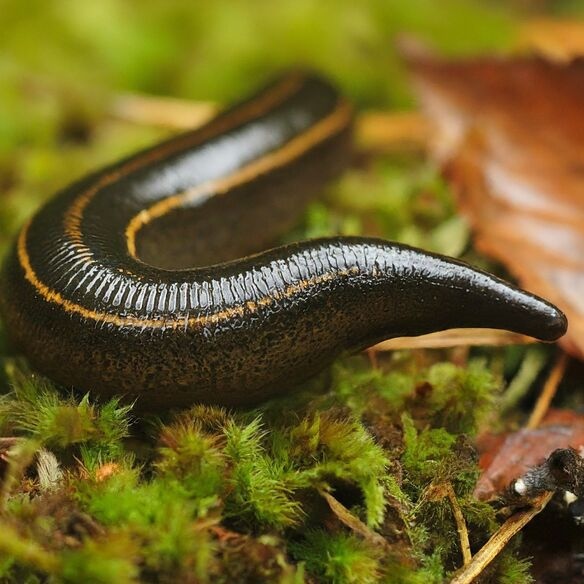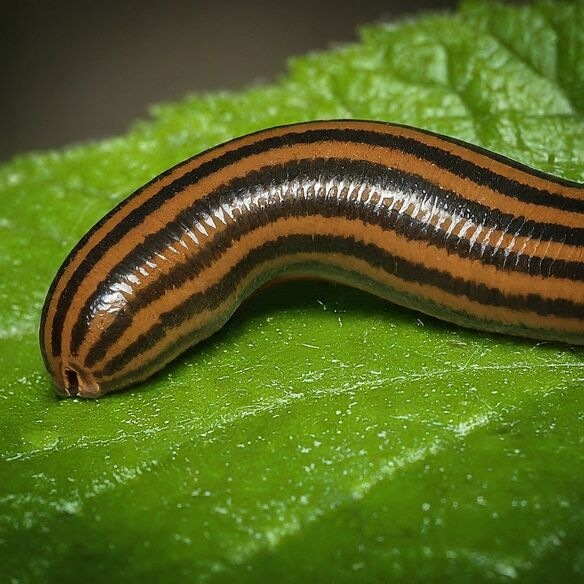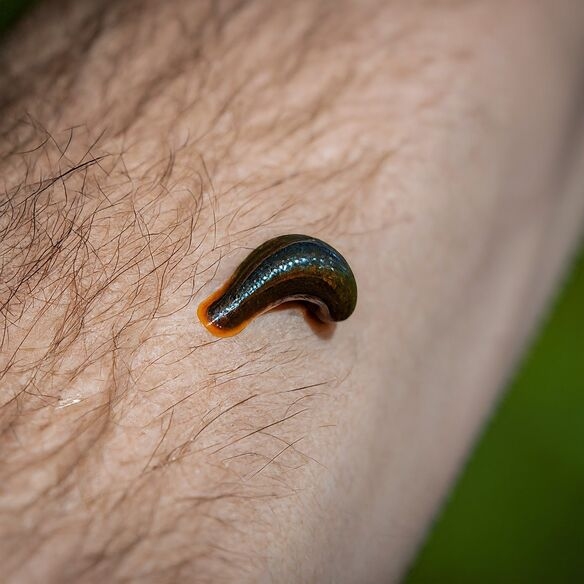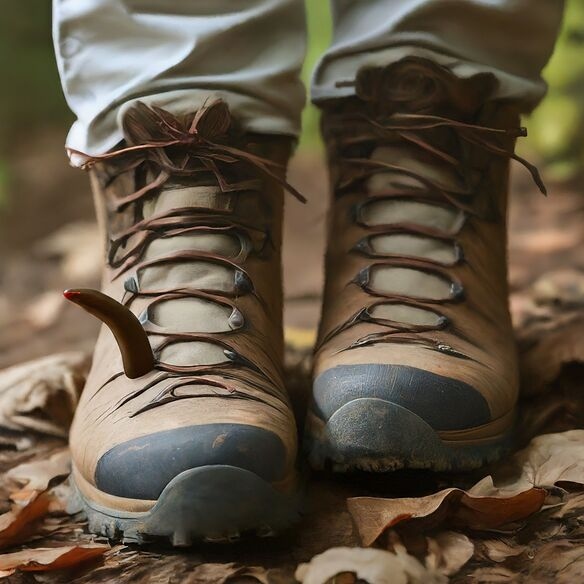
My experience with leech bites goes back to my hiking days in various wet and wild environments. Yep, I’ve been bitten by these little bloodsuckers a few times, and guess what? I’m still here to tell the tale. While they’re not exactly everyone’s favorite creature, understanding them can help a lot.
Now, I get it, the idea of a leech attached to you might seem scary. But in most cases, leech bites are pretty harmless. Usually, they only cause mild bleeding. Trouble can start when there are multiple bites or if they decide to latch onto sensitive spots. This can lead to serious issues like anemia, infections, or allergic reactions.
Every time I’ve been bitten, I haven’t even realised until after the fact. It’s mostly the ick factor that bothers people. Knowing they’re there, calmly dealing with them, and moving on is key. Sharing my experience hopefully demystifies the whole deal. Leeches might seem like little monsters but understanding them helps reduce the fear.
The answer to your question: Are leech bites dangerours? Generally, no. Let’s delve in to the world of leeches and help you understand the best way to deal with them.
Understanding Leech Behavior and Anatomy
Leeches are fascinating creatures once you get past the whole blood-sucking thing. With over 600 species, they can be found in freshwater, oceans, and damp land areas. These little guys have suckers at both ends and produce anticoagulants in their saliva, which helps them feed by keeping your blood flowing smoothly. Plus, they can expand up to ten times their size when they have a full meal! Here is more information on leeches.

How do Leeches Find Their Prey?
You might wonder how leeches find their prey. They use a combination of shadows, movements, body heat, and chemical signals like sweat and carbon dioxide. Land leeches, especially those hanging out in Southeast Asia and other tropical regions, are pretty active hunters. They can often be found waiting for their next meal in lush, wet forests.
Don’t Confuse Leeches and Ticks
People often get confused between leeches and ticks, but they’re quite different. While ticks are more closely related to spiders, leeches are more like worms. One critical difference is that leeches can attach internally. Yep, that means they can enter body openings and latch onto internal organs. This can cause severe complications like difficulty breathing or vomiting, which is a lot more serious than the usual external bite.
So why does all this matter? Understanding how leeches operate can help you stay calm if you ever encounter one. Knowing they’re just doing their thing, usually without causing serious harm, can be reassuring. Being informed can save you from unnecessary panic and help you handle the situation like a pro.
Risks Associated with Leech Bites
- Alright, so we know leeches are usually harmless, but what about when things go wrong? Most bites are painless and cause only mild bleeding. However, the anticoagulants in their saliva can make that bleeding last longer than you’re used to.
- In some cases, multiple bites or bites in sensitive spots can lead to bigger issues. For instance, anemia can occur if you’ve got several leeches feeding off you at once.
- There is also the risk of infections, if a bite site becomes red or has pus it’s a sign of infection.
- Leeches can carry bacteria, which can be transmitted through their bites. While rare, diseases such as syphilis and erysipelas have been reported. So, it’s not just about the immediate bite—there’s also the matter of what they leave behind.
Internal Leech Attachment
Now let’s talk internal leech attachments. In all my 40 years of hiking in groups, I have never heard of this happening to a hiker. So it’s rare, but certain leech species can get into body openings like nostrils or even down your throat. These situations escalate quickly, leading to symptoms like unusual bleeding, fever, and trouble breathing.
For me, keeping track of these risks hasn’t made me a leech enthusiast, but it does help me stay prepared. Being aware of what to watch for after a bite can make all the difference.
Safe Removal and Treatment of Leech Bites
- Getting a leech to detach might seem like a daunting task, but it’s pretty straightforward when you know the right steps. First, locate the leech and stretch the skin nearby. Use a fingernail or a thin object like a credit card to slide under the leech’s mouth and break the suction. Once detached, gently flick the leech away. My personal preference is a credit card which I have in my cell phone case.
- After the leech is off, clean the wound with soap and water to get rid of any remnants of its saliva. Applying a bandage can help stop the bleeding. A cold pack will reduce pain or swelling, making the aftermath a lot more comfortable.
- For leeches in hard-to-reach spots like nostrils or ears, it’s best to seek medical help. Doctors can remove them safely, avoiding any further complications.
- Avoid using salt directly on the leech, along with fire, shampoo, bug repellent, or forcefully pulling the leech off. These methods can make the leech regurgitate its stomach contents into the wound, increasing the risk of infection.
- Don’t scratch the bite site. In my experiences, the bite sites became extremely itch for a week after the bite. It’s important to avoid the temptation to scratch thus, avoiding infection. I found keeping a band aid on the site helped to prevent scratching, particularly when sleeping.
Being prepared with the right removal strategy helps make the experience less stressful. Trust me, staying calm and knowledgeable is half the battle.

My Leech Experiences and Theories on Why They Like Me
For some reason leeches love me – just my luck. Not long ago I did a hike in an area of Sydney that is known for leeches. There were about 14 of us, I was in the middle of of the queue and we were hiking on a damp trail with a ferny ground cover. I pulled 32 leeches off my boots. Just as soon as I pulled one off, another would climb on for a ride. I didn’t get bitten but it wasn’t enjoyable as I was too distracted by the leeches to enjoy my surroundings.
Why was I targeted? Here are the theories we came up with:
- The people at the front of the queue disturbed the leeches so by the time I walked past they were ready to pounce on me.
- They were on me and the walkers at the rear were spared.
- I have a blood type they prefer.
- I’m just unlucky.

Preventing Leech Bites and Final Thoughts
- Preventing leech bites starts with the right gear. When adventuring in leech-prone areas, wear long-sleeved shirts, long pants, and closed shoes. Tucking your socks into your pants creates an extra barrier they can’t easily cross.
- Some of my fellow hikers are pretty adamant that leeches can’t bite through ladies’ pantyhose but I’ve never tried this.
- Insect repellents are another great tool in your leech-fighting arsenal. Look for products containing DEET or lemon-eucalyptus extract. A good spray on your clothes and exposed skin can deter leeches from latching onto you in the first place.
- After activities like swimming in freshwater or trekking through damp fields and forests, make checking for leeches a part of your routine. A thorough once-over can save you from unexpected surprises later.
- Check your backpack for leeches before putting it on after a break. I was once bitten on the base of my neck, perplexed by how the leech could have reached there, until I realized that our lunch break spot had a few leeches and it was probably on my backpack and made its was to my neck from there. I now check my backpack before putting it on.
- Leech bites are generally more of a nuisance than a serious health threat. Knowing how to prevent them, remove them safely, and treat bites if they happen makes all the difference in handling these little critters.
Arming yourself with knowledge and staying prepared lets you enjoy your outdoor adventures without the unnecessary worry of leech bites. Enjoy nature, stay safe, and remember, it’s all part of the adventure!

Hi Lyn,
I have to admit, in all my years of hiking, I’ve never run across leeches. Wow, what great info you’ve shared, especially the tip about using a credit card to remove them! I would have just pulled on it, but it makes sense to use something flat. Everyone has a plastic card of some type on them, so that’s an excellent tip!
My wife and I hike a lot, usually on a couple of hour trips, and while we don’t venture into any crazy off-trail locations, I’ve been tempted to explore more beautiful spots.
Your insights into leech bites are really helpful; it’s nice to know they’re not as dangerous as they seem. I’m excited to hit the trails soon and keep your advice in mind.
Great read! I can’t wait for your future content!
Thanks!
Opa
I really appreciate the practical advice you shared about leech bites. It’s so true that the ick factor is often what scares people the most. Your calm and realistic approach to dealing with them makes the whole situation feel much less intimidating.
I had no idea there were so many different types of leeches or that they could attach internally – yikes! Luckily, it seems pretty rare, but it’s great to be aware of it. Your tips on removal, especially avoiding the whole salt and fire myth, are spot on. I love the idea of using a credit card to safely detach them!
Also, the prevention strategies are gold. I’ve heard of the pantyhose trick before but never tried it either! The idea of checking your backpack is a new one for me though, and I can see how easily that could happen. Thanks for the heads-up!
Your article reminded me of a trip my husband took hiking. It was 20 or more years ago, a very hot summer day and we were sweating from the heat. We came up to a small stream and just could not wait to get rid of our clothing and hop in the cool waters. All was great until we got out and were both covered with baby leaches Yikes!!! grabbed our towels rubbed down, checked each other, and laid out in the hot sun. Thankfully they were all tiny baby leeches no big ones 🙂
Thanks for sharing your experiences with leeches! It’s reassuring to know that leech bites are generally harmless, but it’s good to stay informed about the risks, like infections or multiple bites causing anemia. Your tips on prevention, like wearing proper gear and checking for leeches afterward, are really practical. I’m curious, have you ever had any close calls with internal leech attachment during your hikes, or do you think it’s mostly a rare occurrence? Stay safe out there, and thanks for the helpful advice!
Hi Hanna,
Thanks for your feedback. No I have never had a close call with internal leech bites.I think it is quite rare, the only time I could see it happening is if you went for a swim and came out with a whole heap of leech bites. I must admit the thought of an internal bite is pretty grose.
Thanks again,
Lyn